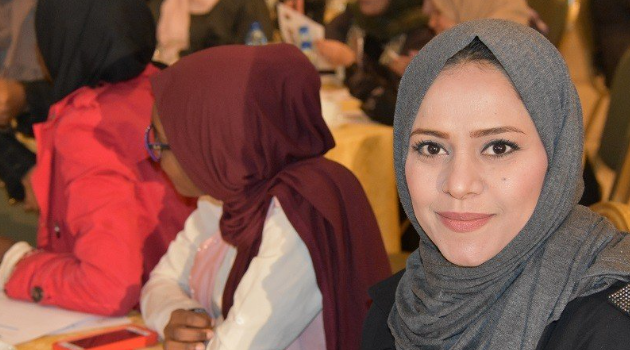Written by Noha Abdelgabar, Advancing Libyan Women’s Participation During the Transition (AMEL) Project Manager, with the support of her UNDP Libya colleagues: Doina Munteanu, Strengthening Local Capacities for Resilience and Recovery Project Manager; Chika Ohashi, Programme Analyst; and Sultan Hajiyev, Country Director.
How can we work together with Libyan women and men to produce real and sustainable change in Libya?
Libyan society, has, at times, been portrayed as a very conservative one in which dominant societal norms and gender stereotypes restrict women’s freedoms and equality in the private and public spheres.
Working for Libya with women, we have come to realize that women have persisted in trying to advocate for, and protect their rights. Libyan women are doing so while facing both physical danger from the ongoing armed violence, and daily life constraints including the ability to move around or between cities, run their businesses.
As UNDP returned to Libya to be next to the Libyan people it is here to support, one of our first steps was to hear from the Libyan women working for several key institutions on their needs. We felt it is crucial to understand how UNDP can support them. We met with the Chairperson of the Women’s Empowerment Unit at the Ministry of Labor, Ms Karima Rajab.
“When the security situation deteriorated in Libya, I abandoned my job as I felt insecure and fearful of being physically assaulted”, she says.
Ms Karima Rajab told us the conflict affected Libyan women enormously. Many lost their loved ones and experienced trauma. With security situation, and some of the societal behaviors changing rapidly many women preferred to stay at home rather than be exposed to physical assaults.
When the security situation improved, many women decided to go back to work but some still feel insecure and unable to make their voices/decisions heard. They felt, and still feel their space in the society has shrunk, and it is still shrinking.
Ms Karim Rajab says she learned of a training course that aimed to encourage women to build their self-confidence and motivate to come up with new ideas to benefit their society, and more importantly, show women how to form their opinions freely.
“We were unsure whether our minister would allow us to take time out and participate in the training”, said Ms Karim Rajab, “but we found our Minister encouraging. The Minister empowered us to attend the training course that allowed us to learn and apply ways to develop our self-confidence and come up with new ideas to support women economically.”
Now, a number of women’s empowerment units have been established in key institutions. We are working to connect all the units together through a network to encourage and empower women to work hand-in-hand with men to contribute to the development of their society in various ways including economically and politically, and, more so, to review laws that restrict women’s rights.
Our interaction with the Chairperson of Women Empowerment Unit at the Ministry of Labor reminded us of our interaction with experts that UNDP brought together last month to exchange new ways of making women economically independent, especially in areas which experience crisis.
The UNDP event highlighted the importance of encouraging those who have suffered physical assault as a result of conflict to identify ways of engaging women in activities to support them to become economically independent. This is especially important for women at the grassroots level.
At that UNDP event, our interaction with practitioners working in different countries in the Arab region stimulated us to think of new ways to bring women and men to work together so that they can help accelerate the changes needed to support Libya’s women and men.
We are now consulting women and men who have deep knowledge of their own context on what would work best for them and their communities.
We will be working together with Libyan women and men over the coming weeks and months. UNDP is determined to further strengthen partnership on gender with other UN partners, with support from international community.
We hope to step up our focus and ability to support gender under existing initiatives and also design a comprehensive intervention that addresses the needs, and concerns, and also harnesses rich potential of women such as the role of women in developing their business enterprises, women’s role in peacebuilding, and awareness-raising about the rights of women and girls to reduce their exposure to physical assault whilst also promoting women’s economic activities.
We believe it is crucial to review wide range of options for doing so, including through innovative solutions such as a E-Platform for Gender Empowerment (EPLAGEM).
(Source: UNDP)





